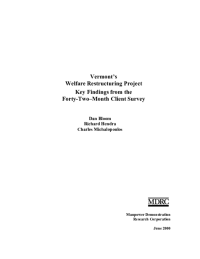Vermont's Welfare Restructuring Project
Key Findings from the Forty-Two-Month Client Survey
Vermont's Welfare Restructuring Project (WRP) was one of the first statewide welfare reform programs initiated under waivers of federal welfare rules that were granted before the passage of the 1996 federal welfare law. WRP required most single-parent recipients to work in wage-paying jobs once they had received welfare for 30 cumulative months (two-parent families with an able-bodied primary wage earner face a full-time work requirement after 15 months of benefits). It also included a set of financial work incentives, consisting of supports for families who leave welfare for employment, as well as changes in welfare rules intended to encourage and reward work. This report presents key results from a follow-up survey administered in 1998 and 1999 of approximately 2,000 parents who applied for or received welfare in Vermont in 1994 and 1995. In general, the survey results confirm that WRP increased employment and reduced public assistance receipt for single-parent families, but it did not significantly affect family income, levels of savings, assets, or food sufficiency. There is little evidence that WRP has affected the well-being of children.






